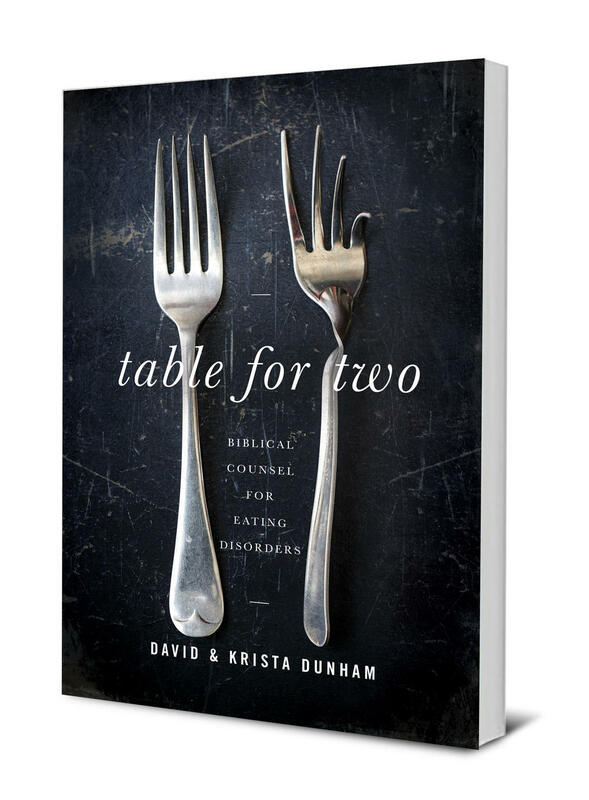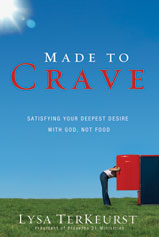David and Krista Dunham: Table for Two
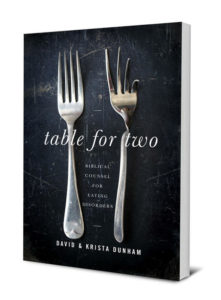
Part 1 of an Interview with David and Krista Dunham, Authors of Table for Two Breaking free from an eating disorder is difficult and complex. Those who are suffering often feel misunderstood and struggle with feeling alone and afraid, ashamed to tell those closest to them. At the same time, their loved ones also feel helpless and ill-equipped about how to help and care for them. Within this dynamic, hurt, disappointment, and neglect often thrive. From the unique perspective of a husband and wife team, Table for Two: Biblical Counsel for Eating Disorders shares Krista Dunham’s journey to freedom from her eating disorder while David Dunham shares insights as the loved one coming beside her. Krista suffered from an eating disorder for over ten years and, by God’s grace and through biblical counseling, overcame it. She openly and honestly shares her experience, describing what she did, what she needed, and what proved helpful in the process of change. Alongside her story, David shares what he did, how he failed, and what he learned along the way as a biblical counselor that was helpful to Krista. Q: Could you tell us a little of your story? When did you first realize you were fighting a battle with food? Krista: Throughout my childhood and teenage years, I had always been very active with a naturally thin frame. But when I started college, I stopped playing sports and started eating more late-night snacks. I gained the normal “freshman fifteen,” but very quickly felt like I needed to get my weight back under control. I started monitoring my intake of sweets and started going to the gym. But after a car accident forced me to look death in the face, I realized that I did not have the kind of control over my life that I thought I had. Instead of looking to God and being amazed at his sovereignty and control for allowing me to live, I tried to gain my own control. The car accident ended up being a tipping point for me. The moment that I could be alone with my feelings about what had happened, I ate everything in my room and immediately felt like I needed to get rid of it all by purging. It was that moment that I realized I was facing something much bigger and scarier than I even understood. From that point on, I was no longer in control of my diet and exercise. My diet and exercise were controlling me. I didn’t want anyone close to me to know what was going on, but I was terrified of what was happening to me, so I reached out to my boyfriend who lived eight hours away from me at the time. Together we ended up finding help through a combination of medical professionals, nutritional guidance, and biblical counseling. I benefitted from having a helper by my side to ask questions, hold me accountable and reinforce the help I was getting from other sources. Q: Did you realize Krista was struggling, or did she have to tell you? How did you respond to the news? David: When Krista told me that she had an eating disorder, it was a complete shock. I had no clue that there was anything wrong. I owed my ignorance to several factors: (1) We were hours apart attending different colleges, (2) I didn’t know anything about eating disorders, so I wouldn’t have even been able to identify the signs if there were any, and (3) Krista was good at hiding these behaviors. Initially I was shocked and deeply concerned. I tried to be compassionate and understanding, and because I am a planner, I started developing a plan of action on how I was going to help Krista. Over time, however, my motivation waned and my frustration grew. Because I didn’t know enough about the issues, all of my plans were incredibly simplistic and naive. Eventually we got to a place in our relationship where we just didn’t really talk about it until some sort of crisis arose. Q: Physically and psychologically, what is an eating disorder? What are some of the underlying motives that drive an eating disorder? An eating disorder is a pattern of destructive eating habits which significantly impair physical health and psychosocial functioning. There are three common types of eating disorders, though there are a host of variations on these: anorexia (a form of self-starvation), bulimia (a cycle of binging and purging), and binge eating (a compulsive consumption of massive amounts of calories at one time). The motives are as diverse as the individuals who engage in the behaviors, but there are several common ones we can identify. One of the more dominant motives is control, which manifests in an effort to counterbalance feelings of insecurity in other areas of life. I control my food or my weight because it’s one area where I feel like I can have that level of power. Other motives include self-medication, appearance, pride, and self-punishment. In each case a sufferer is looking to their destructive habits to provide something for them to which God offers a better alternative. Q: How does an eating disorder impact the loved ones of a sufferer? No suffering or sin is ever limited in its effect. My love and concern for Krista, for example, meant that I often felt anxious and frustrated because of the harm she was causing herself. No one wants to see their loved ones killing themselves, and functionally, that is what destructive eating habits are doing. Her restrictions and anxieties also meant that there were certain social events that we couldn’t attend together. Meals with friends and family were a big deal, so we struggled to have people over or go to their homes because such events were problematic for Krista. Ultimately, an eating disorder impacts your relationships with those you love. In order for Krista to engage in her behaviors she needed to cut off more and more social events and relationships. People and activities threatened her routines and threatened to expose her behaviors, so she kept people at arm’s length, even me. This created lots of stress on our relationships, which was compounded by my own poor responses to her. Q: How does Biblical counseling provide a framework for overcoming disordered eating? The Bible is far more robust on counseling issues than many realize. In particular, we have found the Bible presents us with a framework for problems that drives us back to the heart. The “heart” in the Scriptures is related to our desires, will, and thoughts, and it is out of the heart that both the “mouth speaks” and we act. As we approached Krista’s destructive eating habits, we began to see from Scripture that these were more than just behaviors, they were behavioral responses to desires. Further, the Bible provides us ways to analyze those desires and channel them in healthy and God-honoring ways. Through Scripture’s overall depiction of people, problems, and change we have developed a philosophy of counseling that provides a framework for working through eating disorders. We call it the Four R’s: Responsibility, Relationship, Restructuring, and Remaining. The Bible treats us as both sufferers and sinners and yet it invites us to take responsibility for our actions, attitudes, and desires. The Scriptures also encourage us to see the importance of our relationship with God through Jesus Christ and with God’s people. Scripture’s teaching on change urges us to both put off destructive habits and replace them with godly ones, so there is a restructuring of our whole lives that must take place as we work through eating disorders. Finally, Scripture invites us to hope and persist in godliness as we move throughout life. Q: How does the book help a couple to communicate more openly? Can you share one of the interactive exercises from Table for Two? David: Part of what made navigation of the issue so difficult for us early on was that I didn’t know what to say or what to ask. I would sometimes ask Krista, “What can I do to be helpful?” but she didn’t know. So we often didn’t talk about the subject at all. The book is designed to help focus the conversation between sufferer and helper in very specific ways. Dialogue about this issue tends towards either pressured accountability or vague generalities. We wanted to provide good questions that allow for deeper conversation and greater understanding. We also wanted those conversations to orient people towards attainable recovery goals. A good example is the interactive exercise at the end of chapter 2. The exercise found there focuses on sharing and listening. Sufferers are invited to share answers to specific questions about their experience of their eating disorder. These are answers that are not often freely given but which reveal the seriousness of the problem, the internal logic behind some of the behaviors, and their readiness to change. The helper’s assignment is to fill out a listening evaluation and identify areas of strength and weakness so that they can improve in their listening skills. As sharing and listening become healthier in a relationship, the relationship itself gets healthier, and the healthier the relationship, the better the help. Q: Do you still struggle with eating? How are you now helping others who are in similar situations to what you found yourself in? Krista: In the book I describe what I have experienced as “victory” or “freedom” or “recovery” because destructive eating habits no longer dominate my life and my thoughts. My eating disorder does not control me anymore, so in that sense, Christ has won, I am free, I am healed. But I do explain in the book that there has yet to come a point that I am 100% free of all temptation about food and body issues. I am being sanctified, but I will never be sinless. As I say in the book, “Food issues are still in the background of my heart,” and that may always be true. So, my recovery is not that I will never struggle ever again, but that I struggle less, and when I am faced with temptation, I know how to face it in a godly way. This is the “already/not yet” concept that we all experience in sanctification as we wait for the return of Christ. Christ has already defeated Satan on the cross but, right now, Satan still has some power, so we have not yet experienced the fullness of that victory. We have been given the power to have victory over sin in this present age, but in the age to come, that victory will be full and complete. I may still have some food rules that try to creep back into my daily habits, or I may still have a sinful thought or two when I climb on the scales at the doctor’s office, but the question is: How will I fight? How will I use the strategies I have in place to get ahead of those issues before they turn into full-blown attack? That is where I need to be honest with my helper, I need to write down what I’m thinking and counteract it with the truth of Scripture, and I need to pray (repent, if necessary) and ask for God to help. Recovery is not that I am free from temptation, but that I know how to deal with temptation so that it leads me to sanctification and not to sin. From the time I started to experience more freedom, I wanted to help others to see the way out. I didn’t want anyone to experience the lost and helpless feelings I felt when I didn’t know where to turn for help. I started by sharing my testimony at women’s events at my church. From that I was asked to talk to a health class at a local school. I try not to shy away from chances to share my story because it is the story of what Christ has done in me and through me. I have shared my story in individual conversations and in large groups. I have also pursued education in biblical counseling in many different avenues in order to prepare myself for opportunities to counsel others in the same way I was counseled. I am currently working toward getting a master’s degree in biblical counseling. Table for Two: Biblical Counsel for Eating Disorders By David and Krista Dunham April 26, 2021 / Retail Price: $15.99 Print ISBN 978-1-645070-74-0 Religion / Christian Ministry / Counseling and Recovery 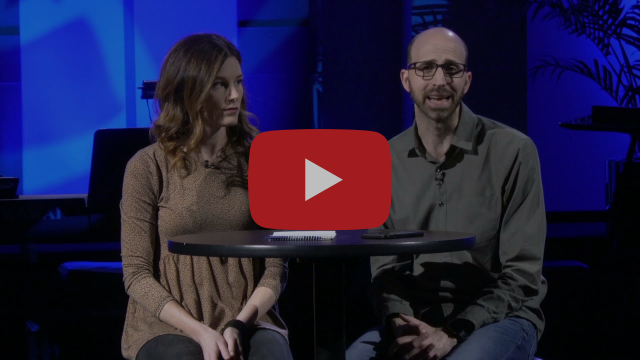 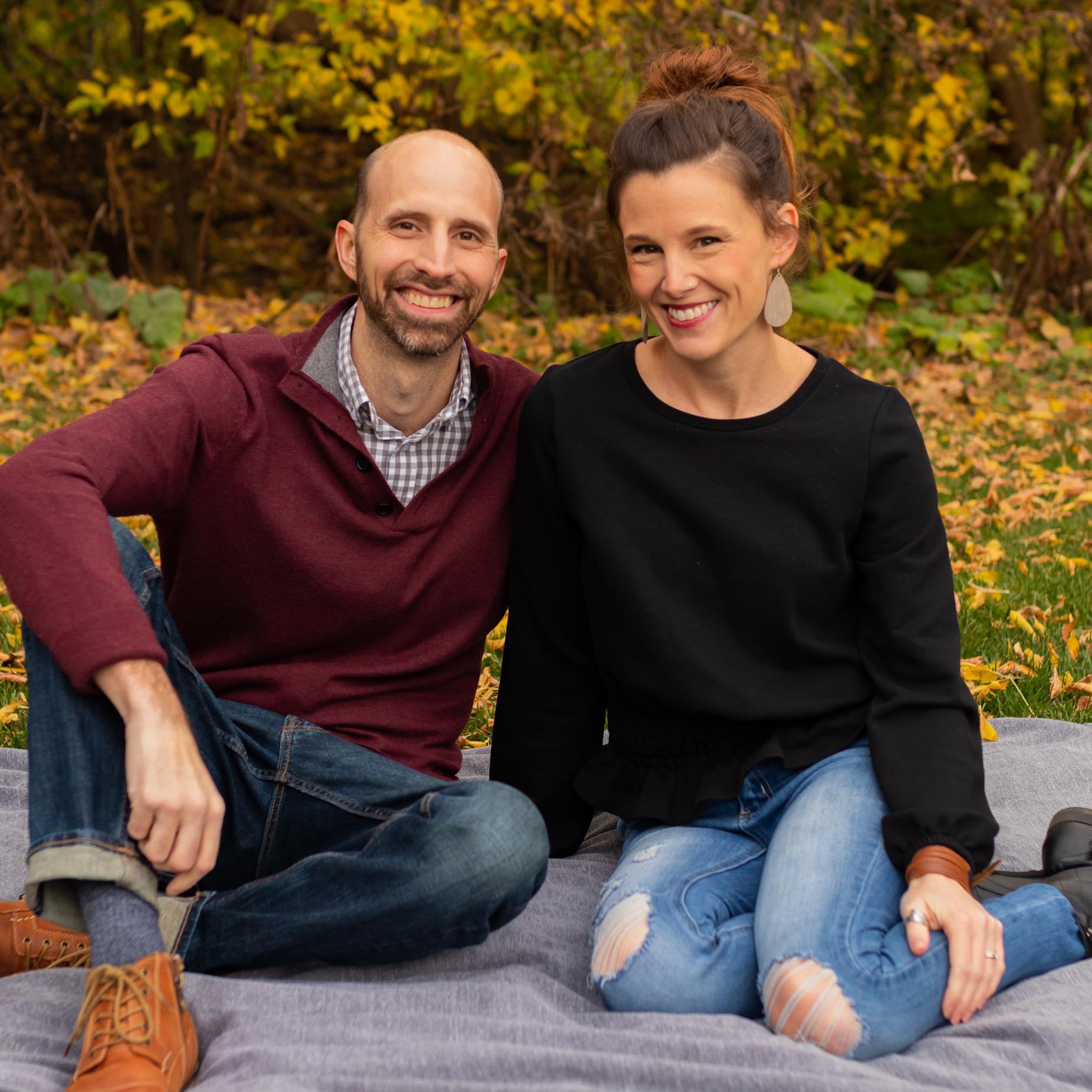 David Dunham, MDiv (The Southern Baptist Theological Seminary), is a pastor and biblical counselor at Cornerstone Baptist Church in Roseville, MI. He is the author of Addictive Habits: Changing for Good and coauthor of Table for Two: Biblical Counsel for Eating Disorders. He speaks refularly on issues related to Biblical Counseling. David and his wife, Krista, have three children. David blogs at www.pastordaveonline.org and can be found on Twitter (@pastor_dave619). Krista Dunham has served as a women’s mentor, biblical counselor, and curriculum developer for various women’s and children’s ministries. She has a degree in early childhood education from Ohio University. Krista suffered from an eating disorder for many years and has been privileged to share her story of recovery and transformation at many women’s events. She is the coauthor of Table for Two: Biblical Counsel for Eating Disorders. David and Krista have three children and live in Michigan. |




